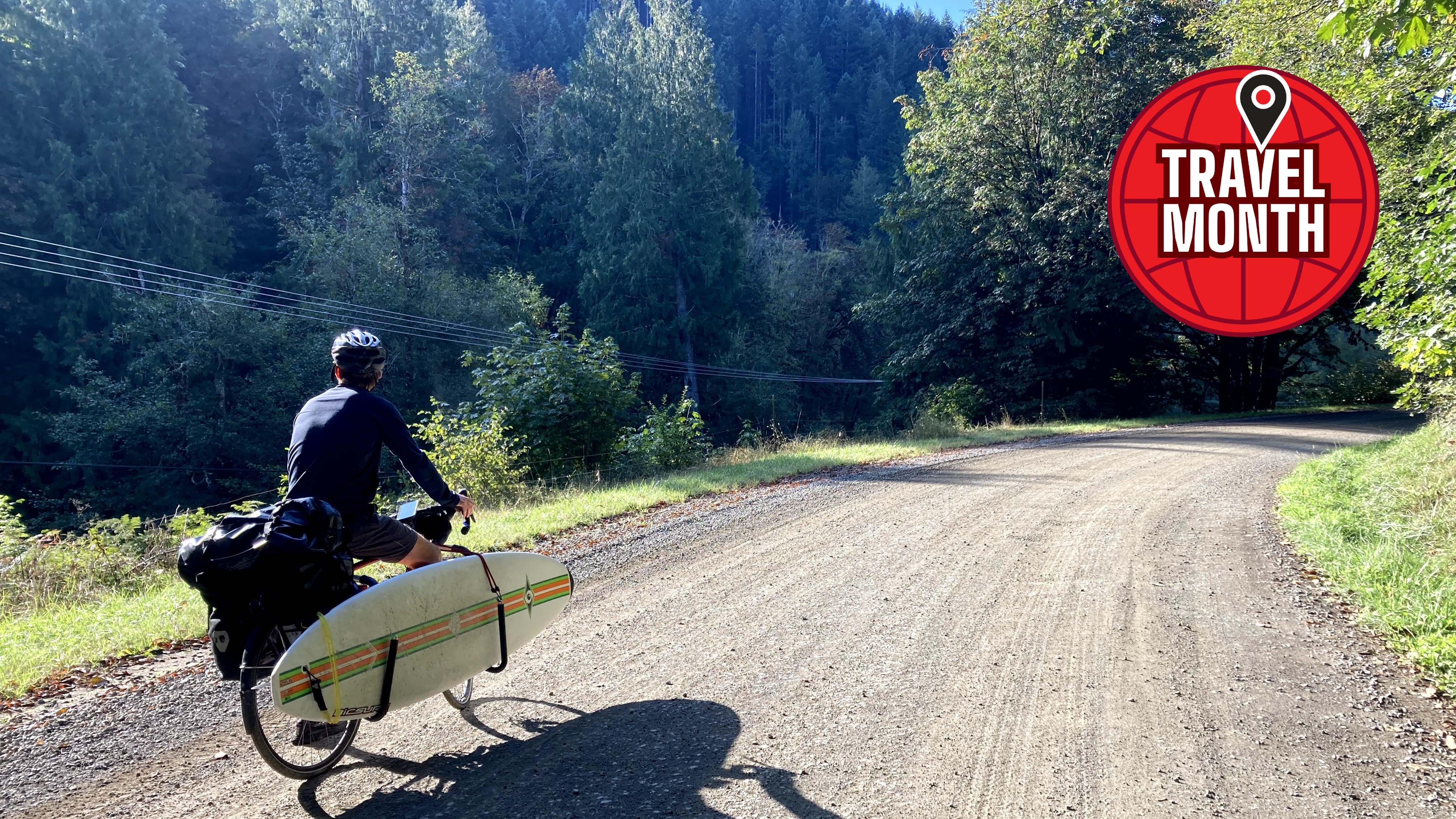
"Jump out of the van," I yelled. Smoke was billowing from the exhaust, and the handbrake was proving ineffective. We pulled harder and harder on the brake until the runaway Mitsubishi finally came to a shuddering halt.
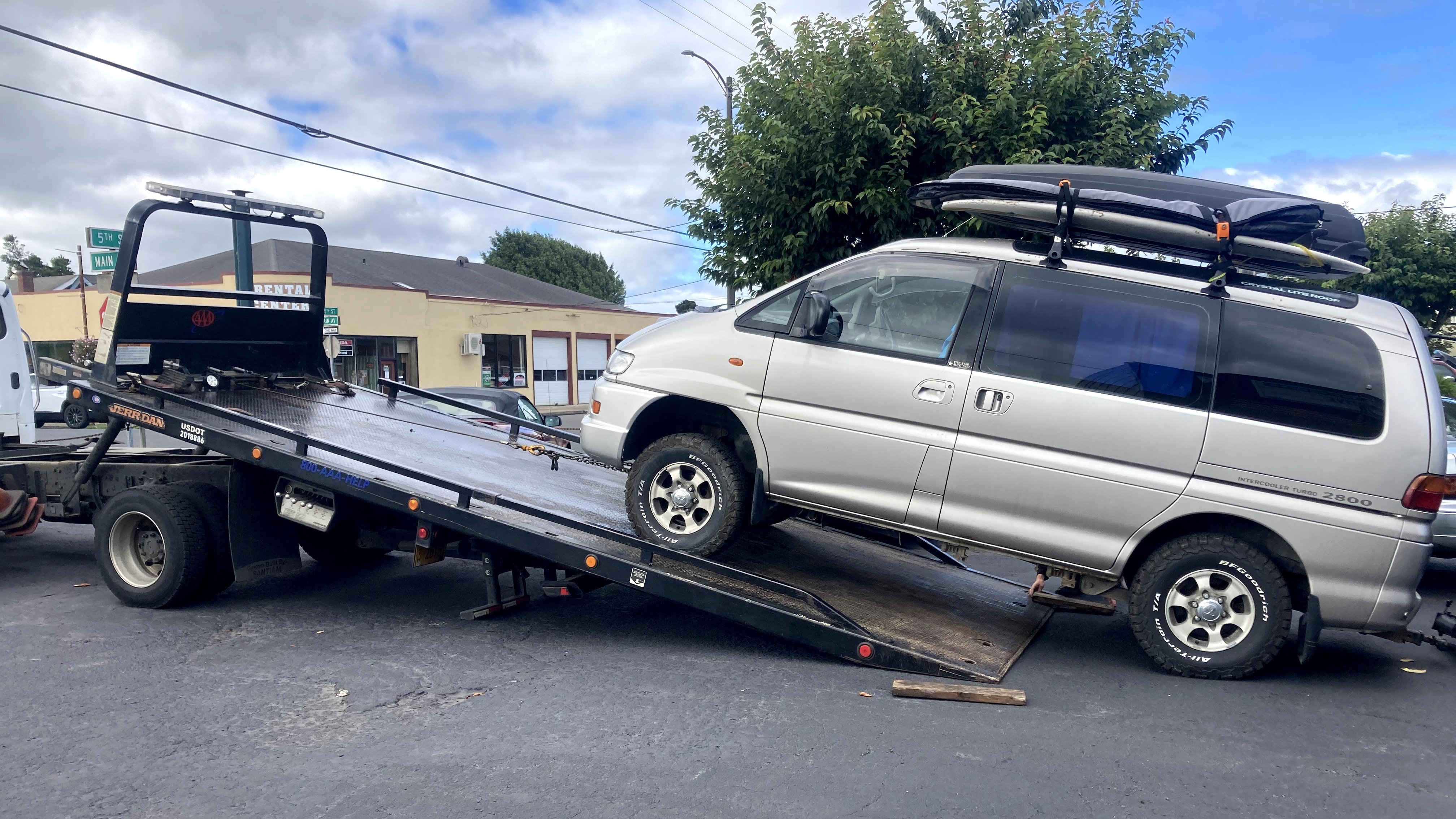
Our plan - to tour the west coast of America by van, surfing as we went - was no more. Improvisation was essential. And, that is how we ended up cycling along the Pacific Coast, with surfboards strapped to our bikes.
Cycle touring was not new to me. I’ve toured Turkey, Greece, Italy, Albania, Germany, France, Canada, and the UK. For the last 11 months, the rolling of tyres has been my one constant. I’ve been on a mission to explore the world, to see what is possible by pedal power. This trip with my partner was meant to be different, an opportunity to sample the luxury of vanlife, travel on four wheels, but it was not to be.
Leaving the van with a mechanic for several weeks, we loaded the boards onto our battered bikes. Creaks were audible, but, it worked.
Exploring the coastline by bike and board
Traversing Oregon’s coastline by bike is an incredible experience. The coast stretches from the Washington border in the north until it meets California in the south, passing through expansive sandy beaches, charming coves, lush forests and quaint towns.
Certain stretches of the road are admittedly somewhat traffic heavy, particularly around large towns like Lincoln, Newport and Florence. This is made worse by the size of many of the campervans; 50ft RVs towed three-ton pickup trucks, which tugged four seater dune buggies. I have never felt so puny on the saddle.

But between drive thru food joints, coffee shops and even ATMs, one need never alight from a vehicle in America, so such convoys are perhaps a canny investment, if you have a few hundred thousand dollars kicking around.
The 101 highway is not however the only route available to cyclists, there are multiple alternative smaller roads, which provide stunning coastal views, and it is little wonder that this state attracts hundreds of cycle tourers each year.
We hit the coast just north of Tillamook, and headed south, stopping at all the decent surfing spots on route including Pacific City, Otter Bay, and Agate Beach. I am not a stranger to a loaded bicycle, but the first few days of riding were pretty tough - saturated wetsuits, water shoes and gloves added extortionate weight, and my poor bike groaned and creaked beneath me, gears crunching as they struggled to shift.
Pedal propelled sails
With the surfboard attached to the side of our bikes, we were essentially pedal propelled sails. Gusts of wind caught the boards, tipping us off balance and catapulting us into the middle of the road or precariously near the cliff top. Going downhill was particularly unnerving, and I gripped my brakes as if my life depended on it (which it probably did).
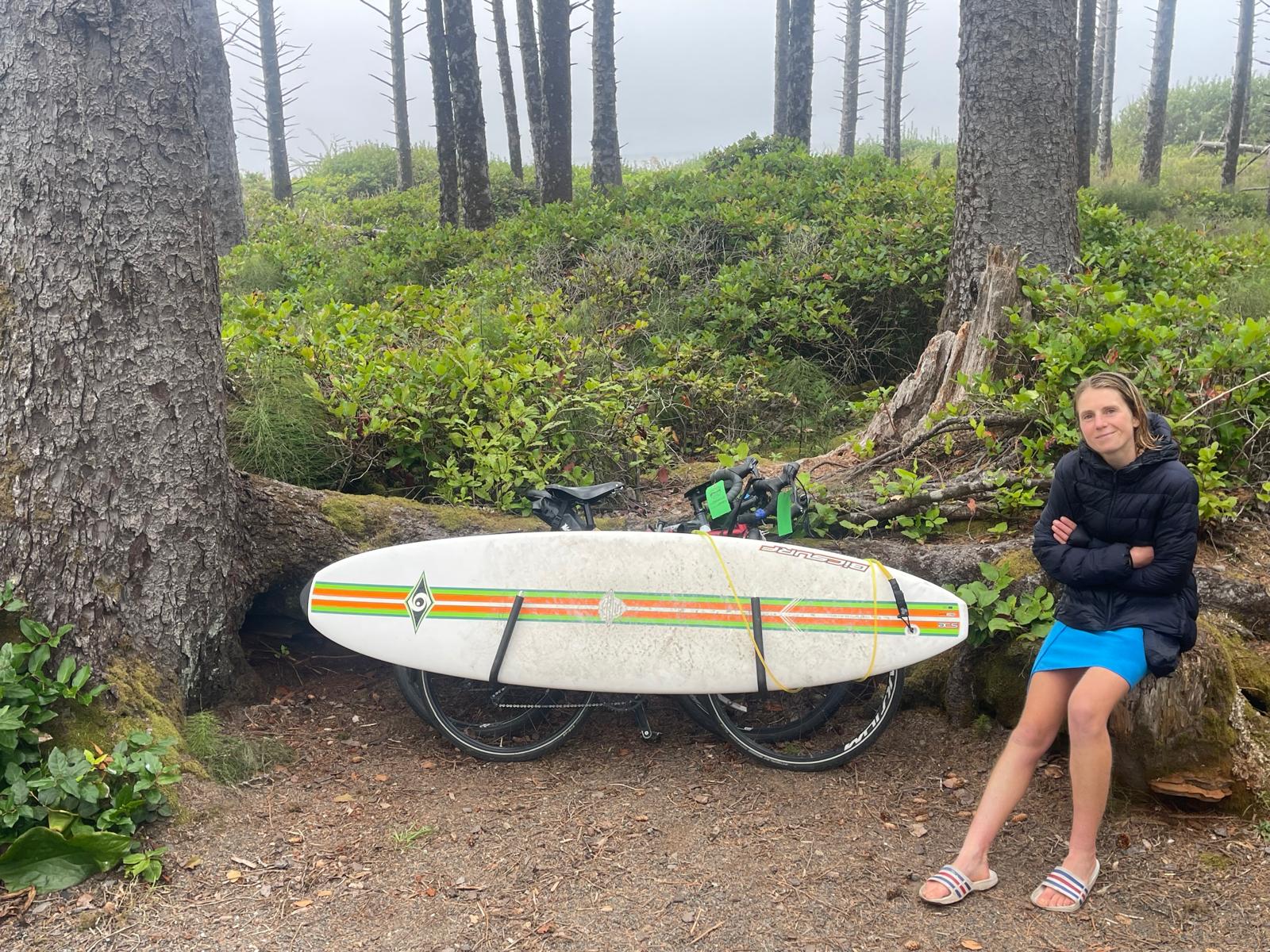
Nonetheless, we trundled along slowly, enjoying the spectacular seascape. The climate on the Oregon coast adds to its mystical nature. While the rest of the state roasted under 40 degree heat, the coast remained beautifully cool. In the morning, clouds of fog cloaked the rugged shoreline, before giving way to beautiful afternoon sunshine.
The most dramatic sections of coastline are found between Newport and Florence, where erosion has produced incredible geological features. With the highway running directly alongside, it is a recipe for perfection by bike.
Benefits of going by bike
At first, as sweat dripped from my brow and my legs burned with exhaustion, I stared longingly at the campervans zipping by, wishing I could be sitting comfortably in my own. Yet, after a while I realised bicycle might in fact be the best way to explore Oregon.
For one, campsites were more easily accessible by bike. Hiker-biker spaces meant ‘No vacancy’ signs did not apply to us; we could waltz right in, enjoying hot showers, phone charging stations and lovely picnic tables for just $8 a night- while drivers looked on in dismay, struggling to find accommodation in the popular late summer tourist season.
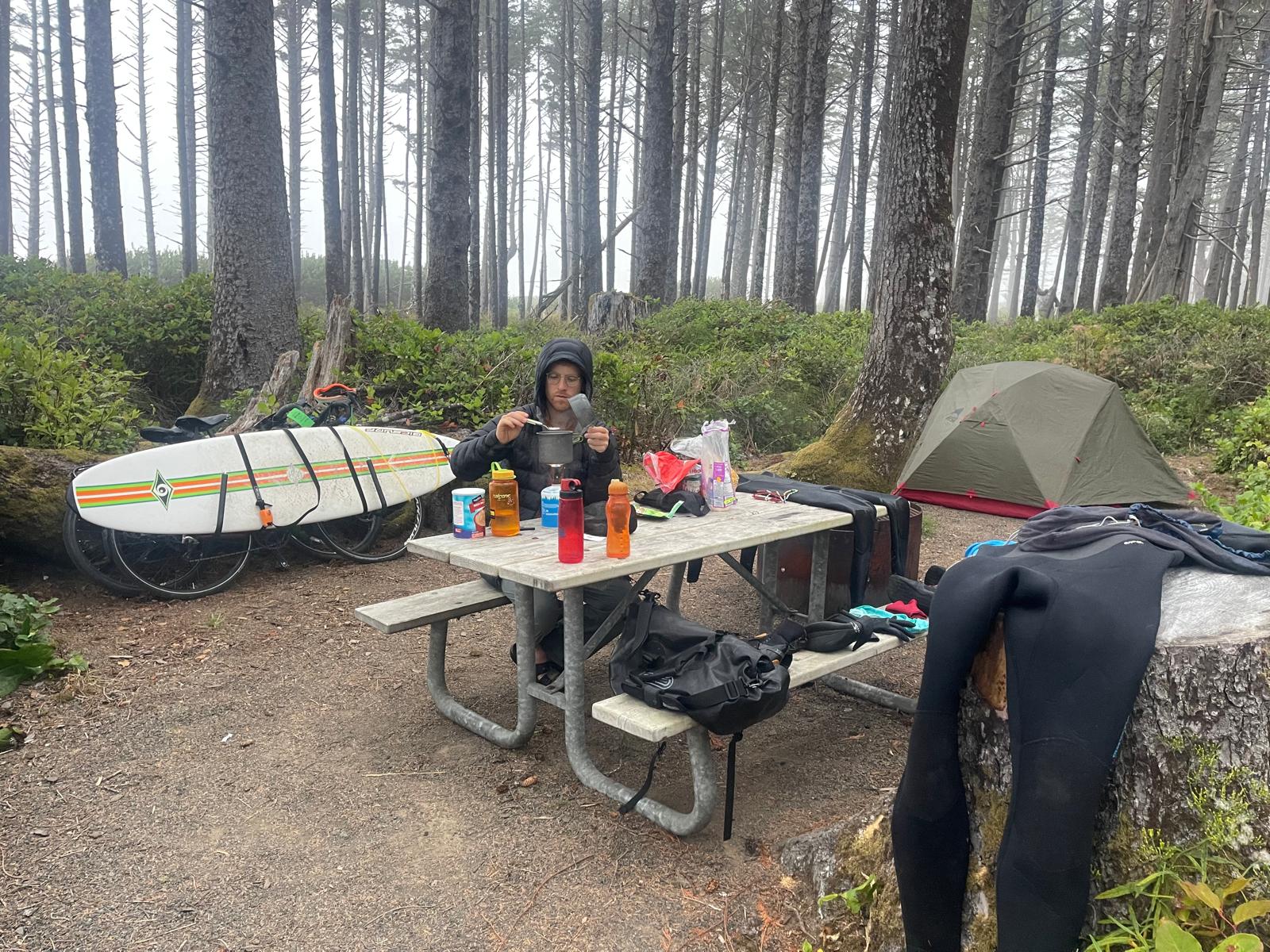
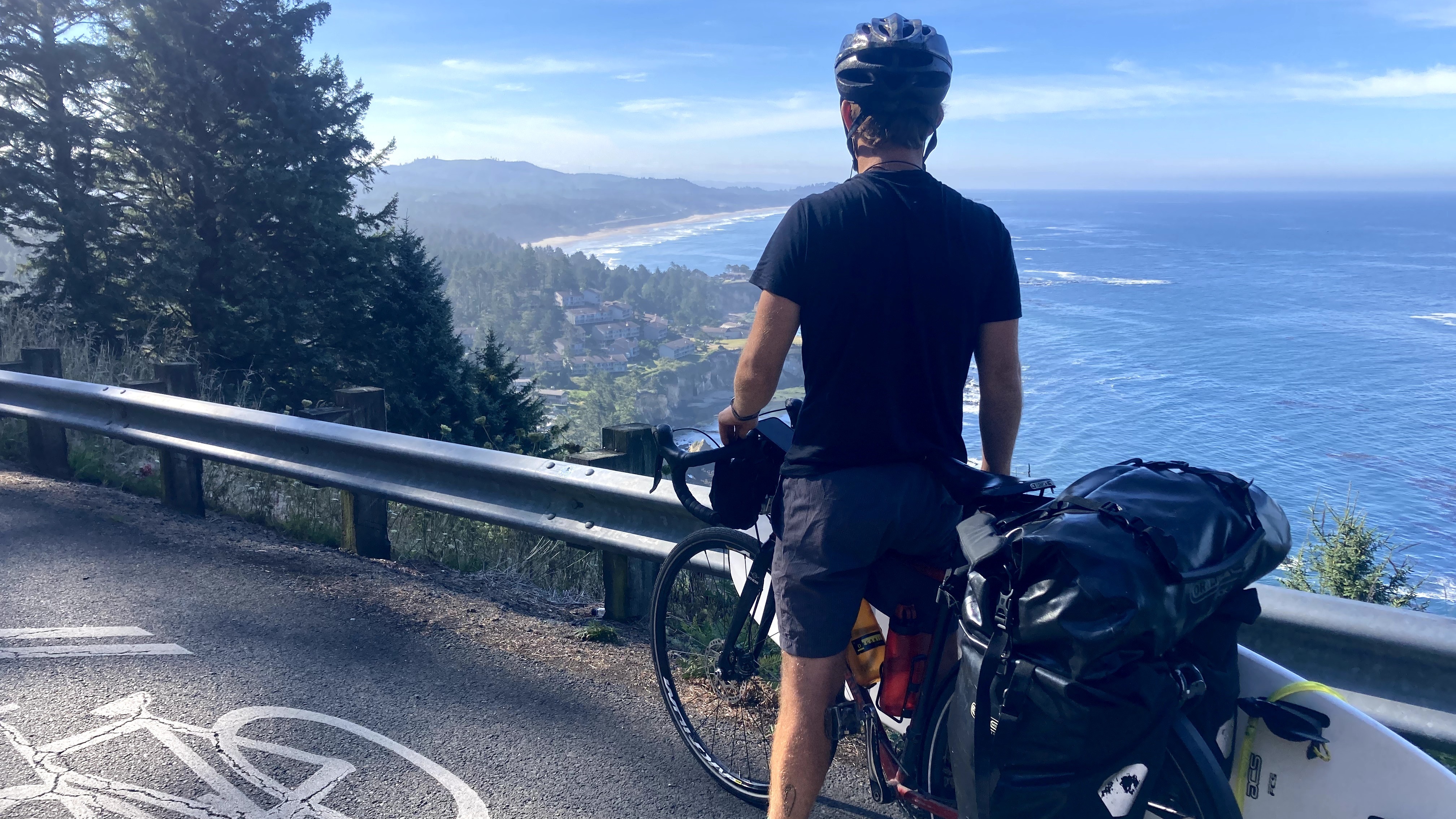
Transporting surfboards turned out to be easier than thought. After exploring the efficacy of trailers, we settled on a second hand surfboard rack (manufactured by a brand called MovedByBike) which slots easily onto the stem and seatpost, with the surfboard sitting horizontally alongside the rider.
At first, I was dubious. All the advertisements for the product featured beaming cyclists, pedalling nonchalantly along a flat seaside boulevard, no additional luggage in sight. This is not the type of trip we had in mind. Would this simple system cope with the hundred of kilometres and large hills ahead?
Our anxieties were unwarranted, this piece of apparatus is sturdier than it appears and operates excellently in combination with standard touring baggage. A bungee cord is a must-have piece of equipment to tether the surfboard to the rack. Without this the board will wriggle around and potentially fall out of the rack.
At each campground we would meet dozens of other cyclists, all taking on the coast in a unique fashion. Some rode carbon fibre racers, others city cruisers; some donned cleats, others crocs; some dined on freeze dried pad Thai, others a bottle of whisky; there were a medley of different characters.
The volume of campgrounds makes for wonderfully accessible cycling. Unlike my previous trip across Canada, there was no pressure to complete a leg and lung aching volume of miles each day; we were never more than an hour or so from the next state site.
Locals and travellers also treated us with a geniality which had not been the case when we had been in the van.
“Surfs up dudes!” Drivers yelled, honking their horns in encouragement.
It was like being a Z-list celebrity, everybody wanted to take our picture and chat, albeit to enquire why we had chosen bikes over motorised transportation.
“You are not like those pesky van-life people,” locals told us. “They make a complete mess!” We nodded vigorously.
“But this trip would have been far easier with a car,” they continued. We nodded even more vigorously.
Of course there were the odd customary derogatory heckles. However, as a regular rider (who happens to be female) I have heard worse; and judging by the grammatically inaccurate expletives on their bumper stickers, my energies were better spent surfing than retorting.
Hitting the waves
We worked our way down the coast, surfing in the morning then pedalling onwards in the afternoon. I say ‘surfing’, but as a complete novice I spent most of my time being battered by the freezing waves, not actually riding them. My partner, a seasoned surfer, looked on with a mixture of encouragement and embarrassment as I desperately tried to keep my head above water.
For those readers who are conjuring images of bikini clad surfers enjoying crystal clear ocean, stop right there, the Oregon ocean is far from the warm waters of Southern California, and I donned a hood, booties and gloves in an effort to stave off hypothermia. Think less BayWatch, more Mutant Ninja Turtle (minus the aquatic aptitude).
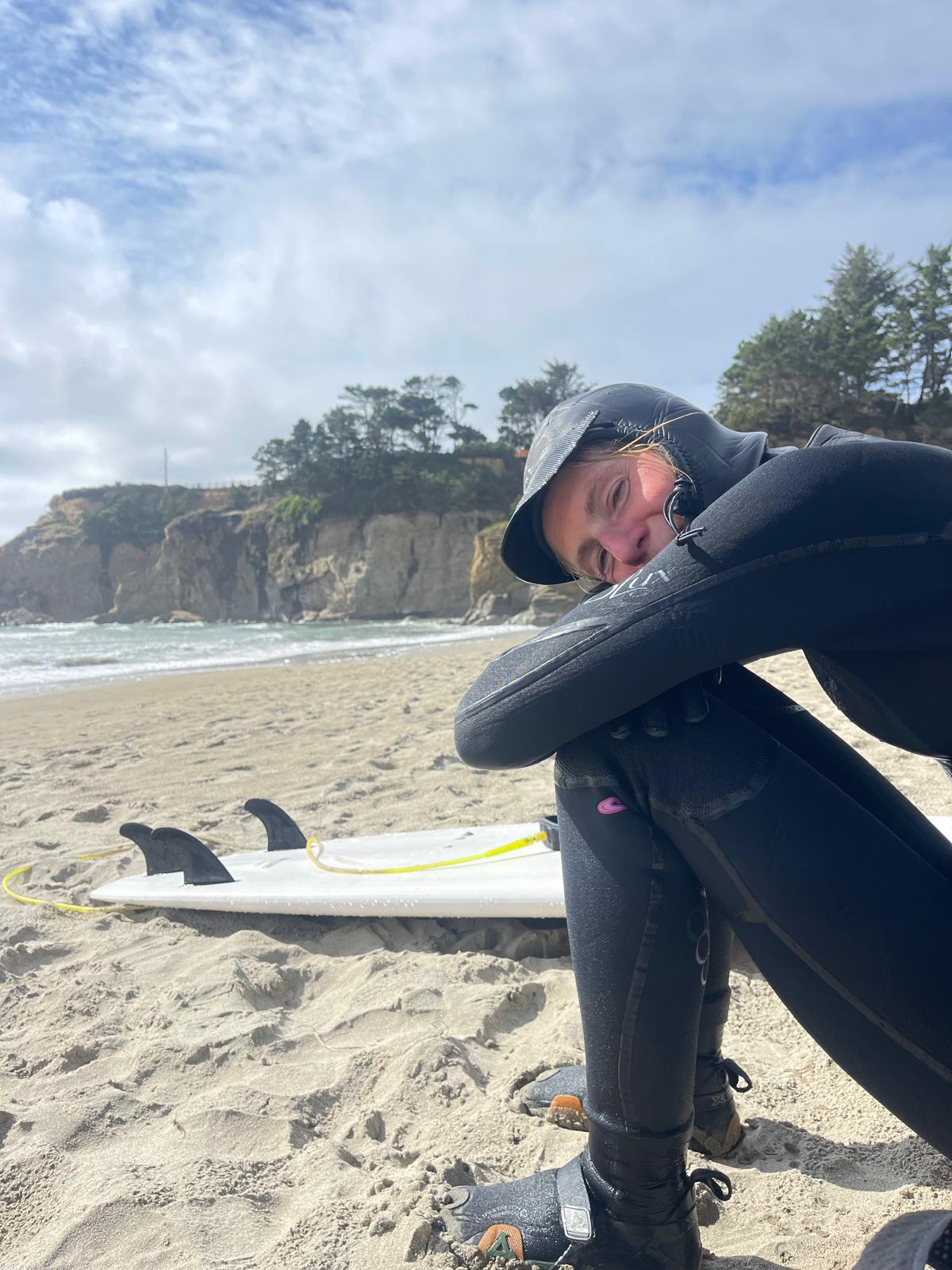
Oregon’s spectacular inlets and beaches make for jaw dropping scenery, but for those seeking social media friendly snaps, you may wish to look further south.
Despite my bruises and sore arms, I realised that combining cycling and surfing was renewing the joy of cycle touring which I had lost sight of after months on the saddle. My aim had always been simply getting from A to B before sunset. Now it was not about the destination, but rather appreciating the landscape, wildlife and conversations with other travellers.
After several weeks, finally we received the call from the mechanic we had been waiting for, and it was time to head back to be reunited with our van. We pedalled inland, put our bikes on the Amtrak (more useful tips below), and headed back to Portland.
Yet, it was with almost a touch of reluctance that I turned the keys in the ignition. Returning to the saddle and to slow travel had been a chance to reconnect with my surroundings, in a way which is impossible by motorised transport. However, as we knew all too well by now, you never know what is around the corner, I may be relying on pedal power again soon.
Bikes and public transport in Oregon
The United States is not famed for its public transport offering. However, it is in fact pretty easy to transport bikes (and surfing equipment) by bus and train, if planned correctly.
For those seeking to reach the coast from Portland without cycling along busy highways, there is a regular bus to Tillamook, which boasts 2 bike spaces and a large luggage compartment at the rear.
The Amtrak is another option if- like us- you are looking for a one way trip down the Pacific coast. Admittedly, trains are not frequent (there are only 1 or 2 per day from Portland to Salem, Eugene and Sacramento); nonetheless, for an additional $5 bicycles are permitted aboard.







